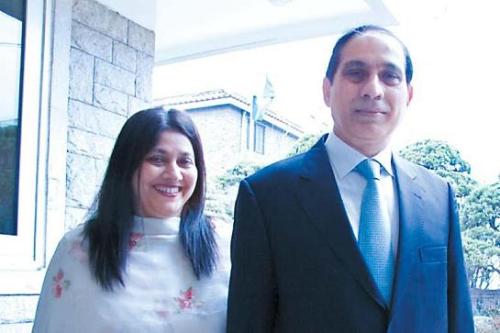The following is a message from Shaukat Ali Mukadam, ambassador of the Islamic Republic of Pakistan, on the occasion of Pakistan Day, March 23, 2012. ― Ed.
I would like to express my deepest appreciation and thanks to The Korea Herald for bringing out a supplement on the occasion of Pakistan Day for March 23. Korea has developed under the dynamic leadership of President Lee Myung-bak and Prime Minister Kim Hwang-sik.
Pakistan and Korea enjoy very cordial relations which are deep-rooted in history. It was in the 4th century that the monk Maranantha traveled from present-day Chota Lahore, Swabi, Pakistan and to what is now South Jeolla Province, Korea. There is at present a statue and museum in South Jeolla Province commemorating the visit. Pakistani and Korean workers played a pivotal role in the construction of infrastructure, roads and bridges in the hot climate of the Middle East in the 1960s and ‘70s. The Korean workers returned to their country as Korea gained affluence and transformed from an aid-recipient country to an aid-donor country and one of the leading players in the global economy.
Pakistan also shares in part of the Korean success story as Korea emulated Pakistan’s five-year plans prepared by a prominent Pakistani economist working in the World Bank, Dr. Mahboobul Haq. Today, Pakistan-Korea relations have come a long way as Samsung C&T built Dubai’s Burj Khalifa, the tallest building in the world, and Pakistani technicians and workers played a sizeable role in the project.
Pakistan and Korea have excellent bilateral relations in the political, economic, trade, cultural, military and educational fields. We have the strength of 36 MOUs and agreements, which is a testimony to the solid foundation of our relationship. Our relations, which were established in 1968 at the consular level and at the ambassadorial level in 1983, have progressed exponentially in the intervening years in all facets. Our bilateral trade, which was in the region of $94 million in the 1980s, surpassed $1.55 billion in 2011. Pakistan’s exports amounted to about $737 million and Korean exports to Pakistan close to $820 million.
Most of the prominent Korean conglomerates, such as Lotte Group, K-Water, Sambu, Hyundai Motor, Daewoo E&C, Doosan, DeokJae and SsangYong, are participating in tenders for major infrastructure projects, such as roads, chemical plants, tunnels, hydro power projects and thermal power projects. Among the most significant investments has been the $500 million injection by Lotte Group in a chemical plant acquired from ICI to produce pure terephthalic acid used in the textile industry and the subsequent acquisition of a food and beverage company, KOLSON Foods. Sambu built the 8.5-kilometer Lawari tunnel and is participating in the 84 MW New Bong Escape Hydropower project in Azad Kashmir.
A consortium made up of K-Water, Sambu and Daewoo E&C has started work on the 150 MW Patrind run of the river Hydel Water Project. Korean companies have expressed interest in participating in numerous other hydel power projects in Pakistan. Doosan Heavy Industries and Construction Co. has completed a 175 MW combined cycle power plant worth $160 million. Ssangyong E&C has completed work on reinforcing old ports and construction of docks and subsidiary facilities at the Port of Karachi. Currently, it is working on the $90 million berth reconstruction project in Karachi. DeokJae Construction Ltd. has nearly completed the Mirpurkhas-Hyderabad 64-kilometer dual carriageway public-private partnership project of the Sindh government. Steel giant POSCO has invested $15 million in Tawariqi Steel in Karachi, a $260 million project. It has also expressed interest in the $174 million Pakistan International Bulk Terminal at Port Qasim.
Pakistan-Korea cultural links are founded on a cultural agreement signed in 2006 which will be renewed during a high-level visit. The agreement provides for the promotion of cultural exchanges, photographic exhibitions and exchanges of art and artifacts. The establishment of the Heritage University of Taxila for the promotion of cultural relations between Korea and Pakistan will further cement our cultural bonds and revive the ancient glory and academic excellence of our heritage.
Many high-level visits have taken place from Pakistan to Korea in the past, including by two presidents and three prime ministers. In 2011, the Chief Minister of Sindh Syed Qasim Ali Shah visited Seoul, heading a 30-member delegation from Sindh Board of Investment, which had fruitful meetings with Korean counterparts. The visit of Prime Minister Syed Yusuf Raza Gilani to participate in the Seoul Nuclear Security Summit March 26-27, during which he will also meet Korean conglomerates, will provide further impetus for trade and economic activities. The Federal Minister for Commerce Makhdoom Amin Fahim, along with a delegation of 10-12 members, is also expected to visit Korea from April 25-30. Pakistan will also participate in the Yeosu Expo 2012 from May-August.
There exists a Joint Ministerial Commission which encompasses all areas of political, economic, trade, educational and cultural relations. The Bilateral Policy Consultation is another forum to foster our links. Talks are held regularly between the foreign secretary of Pakistan and the vice foreign minister of Korea. The last talks were held in Seoul on Nov. 18.
The Pakistani community in Korea numbers 10,341 and includes workers, businessmen, professionals and students. A number of Pakistanis have been here for the past 20 years and established their own business in South Korea. The number of workers amounts to around 4,700 and there are more than 510 students.
The Pakistani community is very active and engaged in promoting Korea-Pakistan relations. They participate wholeheartedly in the economic development of Korea.

|
Ambassador Shaukat Ali Mukadam and his wife Kauser pose after thePakistani national flag was raised to mark their national day, on Friday at their Seoul residence. (Kirsty Taylor/The Korea Herald) |
By Shaukat Ali Mukadam, Ambassador of Pakistan







